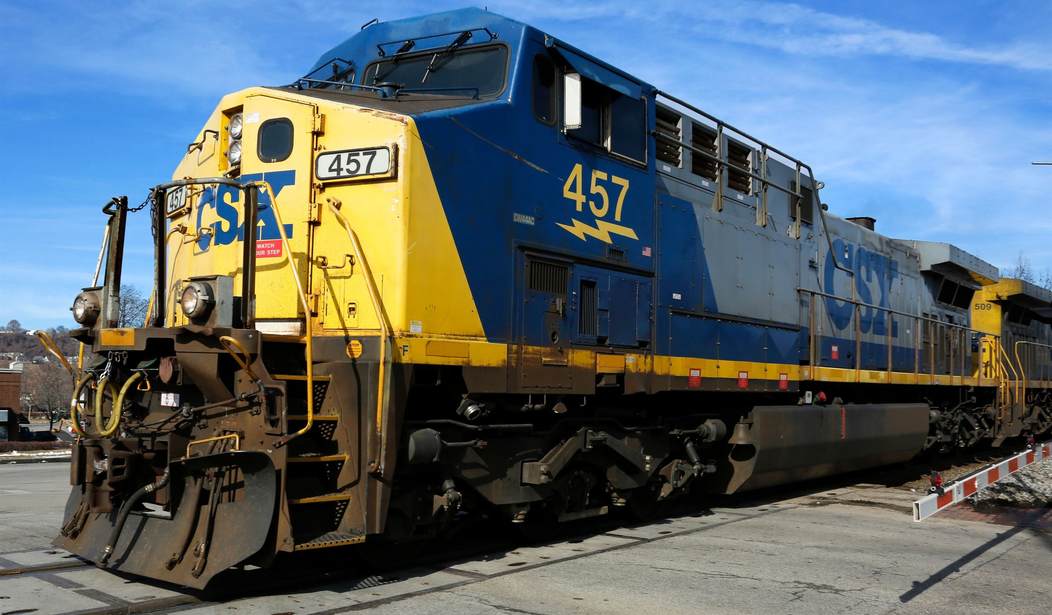As President Biden stumbles and mumbles through his trip to the Middle East, a second railroad union has voted to authorize a strike at the end of the current 30-day cooling-off period. According to an open letter from Sheet Metal/Air/Rail/Transportation Union Transportation Division (SMART-TD) President Jeremy Ferguson, the union’s General Committees have shown unanimous support for exercising the workers’ right to strike. From the letter:
Earlier today, I advised our Rail General Chairpersons involved in national bargaining that the cooling-off period after our release by the NMB will be ending Monday, July 18, at 12:01 a.m., and if a Presidential Emergency Board is not appointed by then, there will be the opportunity to engage in self-help [how unions refer to a strike].
Class I railroad management and the union representatives are clearly at an impasse after meeting all the obligations under the Railway Labor Act (RLA). Negotiations began three years ago, and union workers stayed on the job throughout the pandemic without a wage increase. The parties have engaged in talks independently, participated in the required mediation, and the union refused to enter binding arbitration. The only way to prevent the impending strike is for Biden to appoint a Presidential Emergency Board (PEB).
SMART-TD has 450 locals in the railroad industry and represents more workers than any other railroad union. The other union that authorized a strike, the Brotherhood of Locomotive Engineers and Trainmen (BLET), represents 23,000 employees in the Class I railroads. If both of these unions act on their strike authorizations, Class I trains will come to a grinding halt nationwide.
Related: Could the Railroad Industry Go Completely Off the Track?
Even though the cooling-off period expires at midnight on Sunday and the union leaders obtained strike authorizations, the job action is not automatic. The national union gives final permission for employees to leave the job after 12:01 am on Monday. In 2011, President Obama took it down to the wire and empaneled a PEB on October 7, when the cooling-off period expired. The RLA prohibits a strike for the sixty days the PEB process requires.
However, the railroad industry is in the midst of heightened tensions between management, workers, and even customers. The implementation of Precision Scheduled Railroading (PSR) by management created an environment that did not exist in 2011. According to the unions, implementing this approach to operations slashed staff, increased the length of the trains, and created safety issues. Customers supported the unions’ views in testimony before Congress, complaining about disruptive changes to operating plans and service schedules; degradation of service, such as delays due to insufficient locomotive power and lack of crews; and unreasonable charges.
These conditions will challenge any PEB to devise a solution that pleases both parties. Workers report union leaders told them they expect Biden to empanel a PEB and that it may well be in the 11th hour. Should the board fail to land on a mutually agreeable solution, Congress could make the recommendations of the PEB law and force the employees back to work. The process will conclude in mid-September, which means Democrats would have to force unions to accept a settlement right before the midterms.
It is past President Biden’s bedtime in Israel on Friday. Secretary of Transportation Pete Buttigieg has not stated when the industry could expect a PEB to be appointed. While the rail industry waits, the longshoreman unions on the West Coast are working beyond the expiration of their contract. The parties report expecting an agreement on a new contract in August or September.
However, observers assert that automation at the port facilities remains a contentious issue between the union and management. The Biden administration has been very involved in the port negotiations. Labor Secretary Marty Walsh checks in frequently, and President Biden met with the parties personally on June 10. At this point, there has not been a similar approach with the Class I railroads. Here’s hoping the executive order to appoint the PEB is in someone’s bag on the way to Saudi Arabia.










Join the conversation as a VIP Member